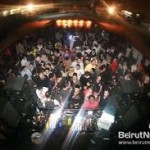
“Did the bombs not put you off?” Habib, a slightly overweight young man shouts in my ear, toppling over a little before correcting himself with an outstretched arm, at the end of which is perched a half consumed gin and tonic. We are standing on the edge of the dance floor in BO18, a former bomb shelter redeveloped into one of Beirut’s hottest new night clubs and tonight is 80′s night. Before I can reply, the crowd cheer triumphantly as the DJ introduces another classic - Bon Jovi - Living on a Prayer.
When that song was number 1 in late 1986, BO18 was still a shelter, Lebanon was still in the middle of a bloody civil war and much of Beirut lay in ruins. Car bombs in the city were frequent occurrences as civilians were targeted by all sides. In the last 20 years, since the end of the war, the city has largely regenerated and reinvented itself. There are still a few older, derelict and bullet riddled buildings obstinately clinging on in the city’s skyline, a grim reminder of those bad old days, but the vast majority are modern high rise hotels.
Beirut’s tourist industry has worked hard to develop a reputation as one of the world’s party capitals. The city’s nightclubs are among the most luxurious and glamorous to be seen anywhere, many are set on the roofs of the city’s new hotels with spectacular views over the mountains and the Mediterranean Sea. Their clientele are the young, the beautiful and the rich not only from Lebanon but from across Europe and the Arab World.
But that was until last week when a car bomb detonated in the nearby district of Achrifiyeh killing 8 people and wounding dozens of others. Then the clubs closed and the partying stopped - but only temporarily. Now only one week later, Lebanon’s nightclubs are open again and the crowds are returning albeit that they are predominately made up of locals.
People in Beirut fear that the latest terror attack will put visitors off coming to the city. Lebanon’s economy is heavily dependent on tourism and a return to the old reputation of a city blighted by bombs and war would be a disaster for local businesses. “What else can we do?” Asks Habib. “We must show the world that Beirut carries on as normal. We want nothing to do with Syria’s problems, look around you, the young generation don’t want to go back to the old days.”
This view is shared by another young Lebanese man I met at the site of last week’s blast. Mark is the same age as Habib and also born in Beirut. He is a clean cut and handsome young man who looks slightly out of place in a pair of blue dungarees. But these are the uniform of the Lebanese NGO, Offrejoie or The Joy of Giving. Mark tells me that he is a banker but has asked his employer for an extended period of absence so that he can assist with the clean up of the aftermath of last week’s blast.
He has just returned from an initial site inspection. “It is pure destruction, my friend.” He explains to me. “The smell is the first you notice.” Food has been rotting in fridges long since disconnected from electricity supplies and the pungent smell of decay hangs in the air. Buildings have had roofs and windows torn away and debris litters the streets.
Mark joined Offrejoie when he was 10 years old. Founded during the war in 1985, the organisation draws young Christian, Sunni and Shia volunteers from all over the country. It’s mission is to promote cohesion between regions and religions; to say “no” to war and instead work together to build a new Lebanon. Now that Beirut’s police and military investigators have finished at the scene of the blast, Mark and his 400 co-volunteers, will spend the next month undertaking the difficult job of making the area habitable again for its returning survivors.
“We don’t want Americans or Europeans to come and do this work.” Says Mark. “And we don’t want bombs and war to be the image the world’s media presents of Lebanon. So we will do this work ourselves. And when we are finished, then there will be time to party.”






